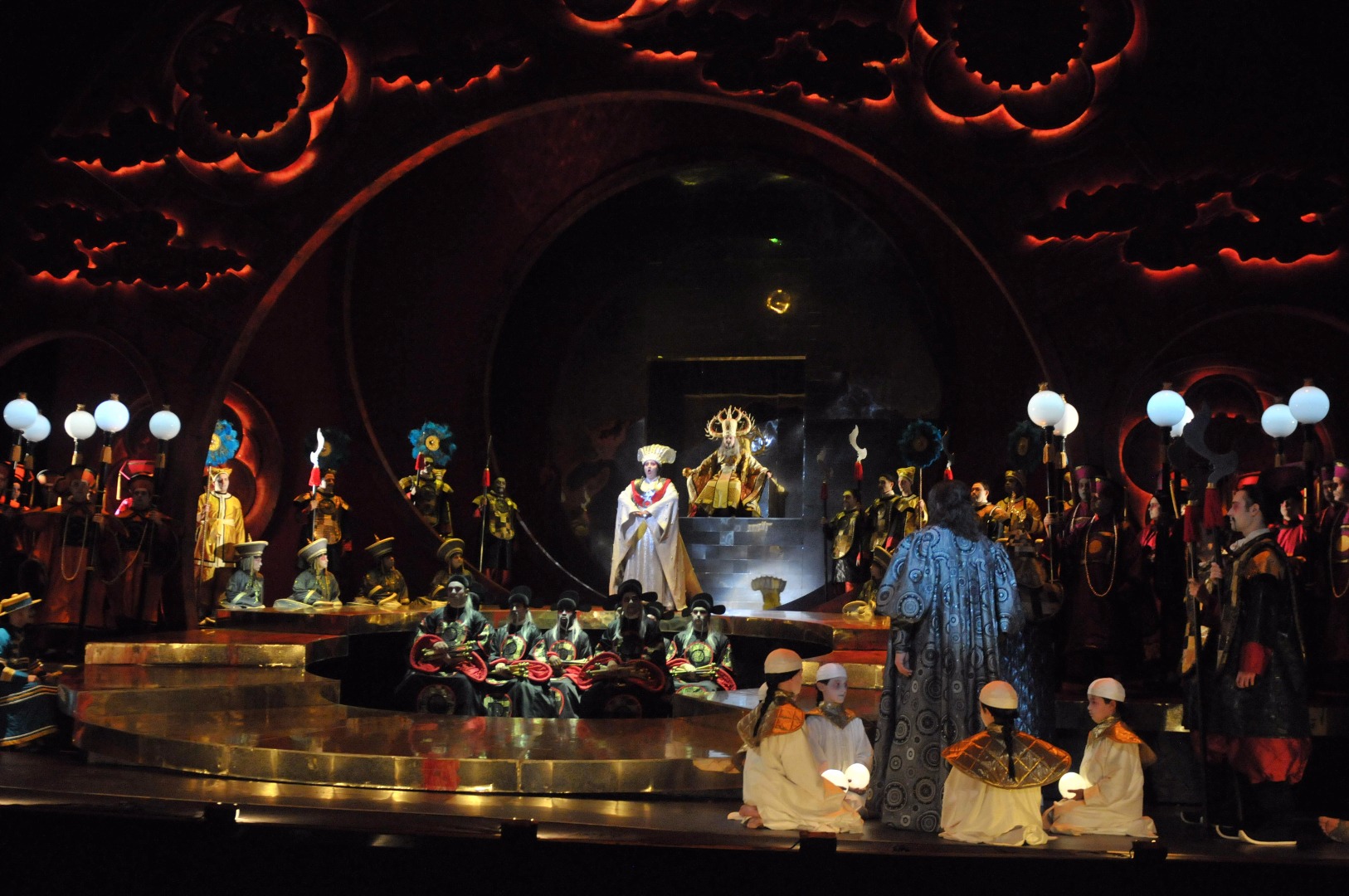 United States Puccini, Turandot: Soloists, Chorus, and Orchestra of Opera Philadelphia/Corrado Rovaris (conductor), Academy of Music, Philadelphia. 2.9.2016. (BJ)
United States Puccini, Turandot: Soloists, Chorus, and Orchestra of Opera Philadelphia/Corrado Rovaris (conductor), Academy of Music, Philadelphia. 2.9.2016. (BJ)

Cast:
Turandot–Christine Goerke
Calaf–Marco Berti
Liù–Joyce El-Khouri
Timur–Morris Robinson
Ping–Daniel Belcher
Pang–Julius Ahn
Pong–Joseph Gaines/Jeffrey Halili
The Mandarin–Johnathan McCullough
Emperor Altoum–Toffer Mihalka
Prince of Persia–George Ross Somerville
Handmaidens–Veronica Chapman-Smith & Jennifer Beattie
Members of the Commonwealth Youthchoir
Production:
Director–Renaud Doucet
Set & Costume Designer–André Barbe
Original Lighting Designer–Guy Simard
Lighting Designer–Anne Catherine Simard-Deraspe
Wig & Makeup Designer–David Zimmerman
Chorus Master–Elizabeth Braden
Stage Manager–Jenny Harber
With its overwhelming sonic brilliance and its potentially (depending on the production) overwhelming visual splendor, Puccini’s Turandot mounts a strong claim, in common with such masterpieces as Verdi’s Aida and Don Carlos, to being one of the truly grand grand operas. Why, then, does it move me so much less than what is for me the composer’s highest achievement, the relatively unsumptuous Tosca, composed two decades earlier?
The answer to that question lies in the stark disparity of human interest between the heroine and hero of the earlier work and the quasi-heroine and quasi-hero of the later one. I care about Floria Tosca and Mario Cavaradossi, who are at the same time serious practitioners of their respective arts and serious and sympathetic human beings. In Turandot, I suppose you could regard the ice-princess as an early political activist, but the historical motivation for her disgust with men can hardly be seen as justifying her policy of beheading one suitor after another. And with his inability to doubt himself for a single moment, Calaf, who finally overcomes her resistance, reminds me forcibly of Margaret Thatcher. If he had had a single sensible bone in his body, he would surely have fallen in love not with the totally repellent title character but with the devoted slave-girl Liù, who stands with the other relatively minor figures Timur and the commedia dell’arte-style ministerial trio of Ping, Pang, and Pong as the only real human beings in the work.
In one embodiment or another, Renaud Doucet’s production and André Barbe’s physical setting, starting from a 2006 staging in Vienna and then co-produced in the US with the opera companies of Minnesota, Cincinnati, Pittsburgh, Utah, and Seattle, have been around for some time. When I saw it first in Seattle in 2012, I found it stunning in its realization of the work’s spectacular aspects, and as successful as could be expected in making the most of its sparse human qualities.
I don’t think Opera Philadelphia’s latest presentation has changed the balance much. The visual element is as stunning as ever. Undoubtedly spectacular, too, is the sonic glory of the orchestra under Corrado Rovaris’s baton and of Elizabeth Braden’s magnificent chorus.
As to the cast of soloists, Christine Goerke’s Turandot is commanding both of voice and of demeanor, but I found the Calaf, Marco Berti, much less impressive: while the firmness and strength of his voice are undeniable, it lacked the slightest trace of bloom or poetry, and the impassivity with which he looked on while, in the last act, Liù was tortured seemed excessively inhumane even by the character’s standards.
Liù herself, in the person of Joyce El-Khouri, had begun somewhat tentatively, but she rose nobly to that final act’s challenge, and it was she and her suffering, rather than the Turandot-Calaf denouement, that stayed in my mind up to and beyond the fall of the curtain. I thought, by the way, that Doucet’s only directorial mis-step came at the moment in the third-act duet when Calaf’s kiss melts Turandot’s ice. Here, according to the stage directions, the Prince “seizes Turandot in his arms and kisses her in a frenzy”—but Doucet instead had Turandot run to the Prince and kiss him. Whether or not this was intended as a feminist touch, it made her complicit in her own defeat, contrary to the sense of the story.
Morris Robinson’s richly voiced Timur carried equal conviction. Toffer Mihalka was an unusually robust Emperor Altoum. (It was in that role, believe it or not, that the great Swiss tenor Hugues Cuénod made his Metropolitan Opera debut at the age of 84.) Aside from the effect of Liù’s final scene, it was the opening quarter-hour of Act II, with Ping, Pang, and Pong sharing nostalgic and regretfully references to the distant homes they will probably never see again, that emerged as the human core of the work. Daniel Belcher and Julius Ahn (the latter was the one holdover in the cast from Seattle four years ago) were intensely appealing as Ping and Pang—a pity one had to revise one’s feelings about these characters when they participated one act later with apparent enthusiasm in the torture of Liù. The scheduled Pong, Joseph Gaines, was suffering from bronchitis, but this problem was ingeniously solved by having him mime the part while it was sung from a desk at the edge of the stage, by an excellent young tenor named Jeffrey Halili.
All in all, this was a highly successful afternoon of grand opera. Now I look forward to the next time I get to see Tosca.
Bernard Jacobson
